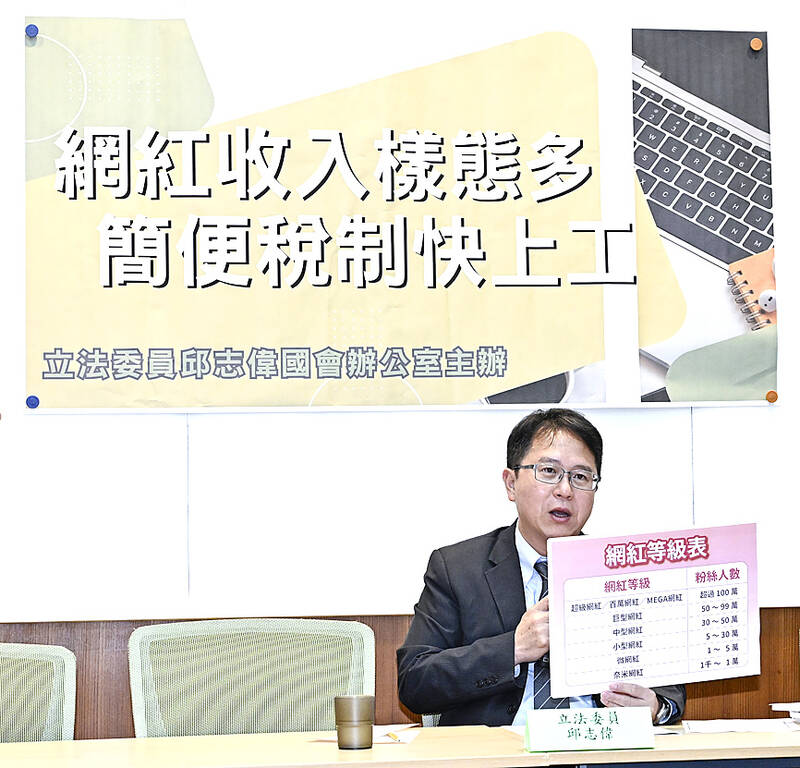Democratic Progressive Party Legislator Chiu Chih-wei (邱志偉) yesterday urged the government to create rules for taxing online content creators, citing widespread confusion in the industry.
Chiu made the comment at a news conference at the Legislative Yuan in Taipei.
A YouTuber known as “Hsiao Yu” (小玉) was recently made to pay NT$460,000 to the Taxation Administration for being in arrears after he confessed to viewers that he netted millions from streaming, but did not know if taxes were owed on that income, Chiu said.

Photo: Chen Chih-chu, Taipei Times
The incident showed that the Ministry of Finance has failed to draft rules and guidelines for taxing the content creation industry, he said.
Tax payment has become entirely dependent on voluntary compliance while some well-meaning creators do not know how to comply with rules that have not been written yet, Chiu said.
Influencers and creators do not readily fall under the existing categories of taxable income stipulated by the Income Tax Act (所得稅法), especially those with 1,000 to 300,000 subscribers and no company registered under their name, he said.
Many creators work under contract with other commercial entities or collect revenue through an online service, causing further complications with taxes, Chiu said, adding that officials are hard-pressed to apply the law or calculate the appropriate amount of taxes owed.
The ministry needs to draft regulations and guidelines governing taxing income stemming from online content, and to review the effectiveness of these rules, he said.
Taxation Administration Deputy Director-General Ni Li-hsin (倪麗心) said that content creators should report all income for tax purposes, adding that it is no different from traditional lines of employment.
According to the law, taxes must be paid for any salary and payment for representing brands, or merchandise sales exceeding the tax exemption limit, she said.
“There is no special treatment for influencers,” she added.

An undersea cable to Penghu County has been severed, the Ministry of Digital Affairs said today, with a Chinese-funded ship suspected of being responsible. It comes just a month after a Chinese ship was suspected of severing an undersea cable north of Keelung Harbor. The National Communications and Cyber Security Center received a report at 3:03am today from Chunghwa Telecom that the No. 3 cable from Taiwan to Penghu was severed 14.7km off the coast of Tainan, the Ministry of Digital Affairs said. The Coast Guard Administration (CGA) upon receiving a report from Chunghwa Telecom began to monitor the Togolese-flagged Hong Tai (宏泰)

A cat named Mikan (蜜柑) has brought in revenue of more than NT$10 million (US$305,390) for the Kaohsiung MRT last year. Mikan, born on April 4, 2020, was a stray cat before being adopted by personnel of Kaohsiung MRT’s Ciaotou Sugar Refinery Station. Mikan was named after a Japanese term for mandarin orange due to his color and because he looks like an orange when curled up. He was named “station master” of Ciaotou Sugar Refinery Station in September 2020, and has since become famous. With Kaohsiung MRT’s branding, along with the release of a set of cultural and creative products, station master Mikan

RISING TOURISM: A survey showed that tourist visits increased by 35 percent last year, while newly created attractions contributed almost half of the growth Changhua County’s Lukang Old Street (鹿港老街) and its surrounding historical area clinched first place among Taiwan’s most successful tourist attractions last year, while no location in eastern Taiwan achieved a spot in the top 20 list, the Tourism Administration said. The listing was created by the Tourism Administration’s Forward-looking Tourism Policy Research office. Last year, the Lukang Old Street and its surrounding area had 17.3 million visitors, more than the 16 million visitors for the Wenhua Road Night Market (文化路夜市) in Chiayi City and 14.5 million visitors at Tainan’s Anping (安平) historical area, it said. The Taipei 101 skyscraper and its environs —

Taiwan on Friday said a New Zealand hamburger restaurant has apologized for a racist remark to a Taiwanese customer after reports that it had first apologized to China sparked outrage in Taiwan. An image posted on Threads by a Taiwanese who ate at Fergburger in Queenstown showed that their receipt dated Sunday last week included the words “Ching Chang,” a racial slur. The Chinese Consulate-General in Christchurch in a statement on Thursday said it had received and accepted an apology from the restaurant over the incident. The comment triggered an online furor among Taiwanese who saw it as an insult to the